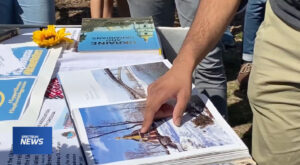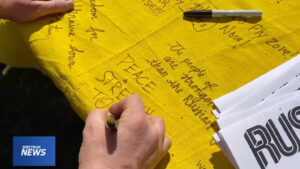 On February 24, 2022, Russia invaded Eastern Ukraine and catalyzed a war. Individuals and communities internationally mobilized to support Ukraine and its people in any way they could, including at UNC. For the academics and educators at UNC who specialize in the region and its history, this support took the shape of a teach in and rally held on March 4, 2022. This event was organized by three Ph.D candidates in the Department of History, Alma Huselja, Pasuth Thothaveesansuk, and Nicole Harry, and a Master’s student in the Global Studies Program, Kathryn Goodpaster.
On February 24, 2022, Russia invaded Eastern Ukraine and catalyzed a war. Individuals and communities internationally mobilized to support Ukraine and its people in any way they could, including at UNC. For the academics and educators at UNC who specialize in the region and its history, this support took the shape of a teach in and rally held on March 4, 2022. This event was organized by three Ph.D candidates in the Department of History, Alma Huselja, Pasuth Thothaveesansuk, and Nicole Harry, and a Master’s student in the Global Studies Program, Kathryn Goodpaster.
When asked about her motivations for organizing the event, Huselja responded, “After the invasion, I had a number of students who talked to me after class about what was going on. I also noticed that besides them, other people I knew were surprised that Russia even invaded to begin with. With so much confusion floating around, I and my colleagues thought such an event would be a good way for people to have an open space for discussion, ask any questions, and hopefully come away more informed about what was going on.” In order to address these concerns, the teach-in consisted of an open floor, where audience members were able to ask questions and share their emotions and responses to the war. Professor of History Chad Byrant delivered a keynote address, and the panelists included faculty from the Departments of Anthropology, History, and Political Science. Also participating were Oleh Wolowyna, a visiting fellow from Ukraine, Suzie Colbern, Associate Director of the Triangle Institute for Security Studies and a historian of NATO, and Elena Trubina, a visiting scholar from Ural Federal University in Ekaterinburg.
Commenting on the motivation behind the event, Thothaveesansuk, a doctoral candidate in Cold War history, noted, “One thing that stood out to me about the invasion was that Putin attempted to justify it based on a series of lies and disinformation about history. As historians ourselves, I felt like we were in a position to help counter the narrative even in a small scale, as well as help our community understand and process what had happened.” Echoing this theme in his keynote speech, Bryant stressed the importance of responsibly analyzing and filtering the mass of information and opinions circulating about the war, especially in social media.
 The teach-in was followed by a rally held at Polk Place in support of Ukraine that included guests from the Ukrainian Association of North Carolina. In addition to speakers and communal conversation, participants also signed a Ukrainian flag that is now displayed in UNC’s FedEx Global Education Center. Reflecting on both the teach in and the rally, Thothaveesansuk added, “I was happy to see that we had not just fellow graduate students in attendance, but also undergraduates, faculty, staff, and other members of the community.”
The teach-in was followed by a rally held at Polk Place in support of Ukraine that included guests from the Ukrainian Association of North Carolina. In addition to speakers and communal conversation, participants also signed a Ukrainian flag that is now displayed in UNC’s FedEx Global Education Center. Reflecting on both the teach in and the rally, Thothaveesansuk added, “I was happy to see that we had not just fellow graduate students in attendance, but also undergraduates, faculty, staff, and other members of the community.”
Since the teach in and rally, other events have also been hosted on campus to educate the community about the ongoing war, including a roundtable of Ukrainian scholars and professionals as well as a benefit concert by a local Ukrainian band. As Huselja highlights, “It is essential, for Ukrainians’ sake, that Ukraine doesn’t simply fall off our news radar or that we become numb to what is going on. Events are a small way to educate people and motivate them to care and act in productive ways — whether that’s through donations, contacting representatives, etc.” The event, which benefited from a lively and engaged audience, highlights the contribution that historians can make, however small, to combating disinformation and speaking truth to power. It reflects the best of a longstanding tradition in the History Department of offering historically informed analysis and context about current events.
–Nicole Harry
